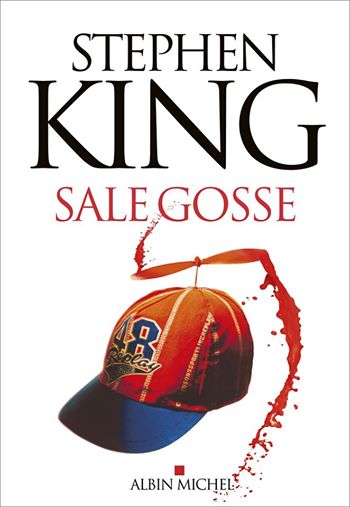March 25, 2014
 In an interview published in Time magazine in 1986, Stephen King mentioned that he planned to study French in order to finish Livre Noir, a detective story written in French, “the language that turns dirt into romance.” That idea never panned out, and one wonders how his publishers would have handled such a book. Obviously they would have had to translate it into English, which would have defeated the purpose, it seems.
In an interview published in Time magazine in 1986, Stephen King mentioned that he planned to study French in order to finish Livre Noir, a detective story written in French, “the language that turns dirt into romance.” That idea never panned out, and one wonders how his publishers would have handled such a book. Obviously they would have had to translate it into English, which would have defeated the purpose, it seems.
Many years ago, when I was living in Europe, I spent a few days in Paris and gravitated toward the vendor stalls that line the Seine. I looked at artwork and antiques, but mostly I was interested in the books. I found a French copy of ‘Salem’s Lot and thought it might be fun to read it in another language. I was certified bilingual when I graduated high school, and had read some of Georges Simenon’s Inspector Maigret novels in the original French, so it wasn’t a Herculean endeavor. I never did get around to cracking open that book, though.
Last year, King went on his first-ever book tour of continental Europe, with stops in France and Germany to promote Doctor Sleep. By all reports, he was well received, both by his local publishers and by fans who traveled many kilometers to see him. As a gesture of appreciation, last week King released a novella eBook in only French and German. The English title is “Bad Little Kid.” In French it is “Sale Gosse” and in German “Böser kleiner Junge.”
Since my German is rudimentary at best, I decided to read “Sale Gosse.” I had to look up a few words and phrases, but for the most part I could follow what was going on. Most of the English idioms translated smoothly—“water off a duck’s back” works in both languages—but it took me a while to figure out “les Anglais débarquaient tous les mois,” which I learned means “her periods came every month,” apparently a reference to the English as redcoat invaders! The hardest part was reminding myself that this was a story set in America—that George’s “southern accent” was not referring to Marseille or Bordeaux.
The setting is familiar King territory: a prison’s death row. The man whose execution is fast approaching is George Hallas. Because his date with lethal injection is nigh, he is granted unrestricted access to visitors; however, the only one who comes is his public defender, Leonard Bradley. Despite George’s reticence to assist his lawyer in his defense, Bradley has persisted in exploring all options and appeals, extending George’s life by a few years.
G eorge’s guards had warned Bradley that his client is likely to want to talk during his final week. He’s remained mostly mum until now, so Bradley is ready to listen when George decides to explain why he emptied his six-shooter into a little boy.
eorge’s guards had warned Bradley that his client is likely to want to talk during his final week. He’s remained mostly mum until now, so Bradley is ready to listen when George decides to explain why he emptied his six-shooter into a little boy.
The story starts when George is nine. He befriended a somewhat simple girl who lives nearby and they often walk to and from school hand in hand. It’s totally innocent, and no one gives them any grief. One day, though, a little brat shows up, taunting the poor girl and luring her into the street, where a kindly old teacher strikes her with her car, killing her. No one else saw this pudgy little brat, a fluorescent redhead who wears shorts, a striped shirt and a propeller hat. The incident is written off as a terrible accident, and George never says otherwise.
This little brat shows up over and over again in George’s life, bedeviling him by doing harm to those he knows and loves. He always looks the same; never ages. The French would probably call him a corbeau—he knows things he shouldn’t, and uses this information to torment George. In a sense, he’s a precursor to the antagonist in the forthcoming Mr. Mercedes, a demented young man who tries to manipulate weak people into killing themselves.
George’s tale culminates with the day he shoots the little kid in front of several witnesses. He doesn’t expect Bradley to believe him—he realizes how crazy his story sounds—but he has to get this weight off his chest before they stick a needle in his arm. It’s too late to plead insanity now, Bradley realizes, but he provides a sympathetic ear and, several days later, he attends the execution.
Where does “Bad Little Kid” fit into the King pantheon? It’s reminiscent of “1922” in the sense that it is a confessional. There’s also an aspect of “N.” to it, given that the confessor seems delusional and his insanity might be contagious. It’s a prison story (paging Frank Darbont!) but most of it takes place outside the walls, even if it is being related through a Plexiglas divider in “Needle Manor,” the nickname of this prison’s death row. And, in the end, it is in line with King’s philosophy that there aren’t answers to every mystery. When Bradley asks George why a demonic child would choose him to harass, George responds that there’s no more explanation for that than there’s a reason why bad things happen to good people or why some bad people live until they’re a hundred.
There are no immediate plans for “Bad Little Kid” to be released in English, but that will probably happen at some point. In the meantime, brush off your high school French or German and give this ~15,000 word story a crack. Bonne chance!
